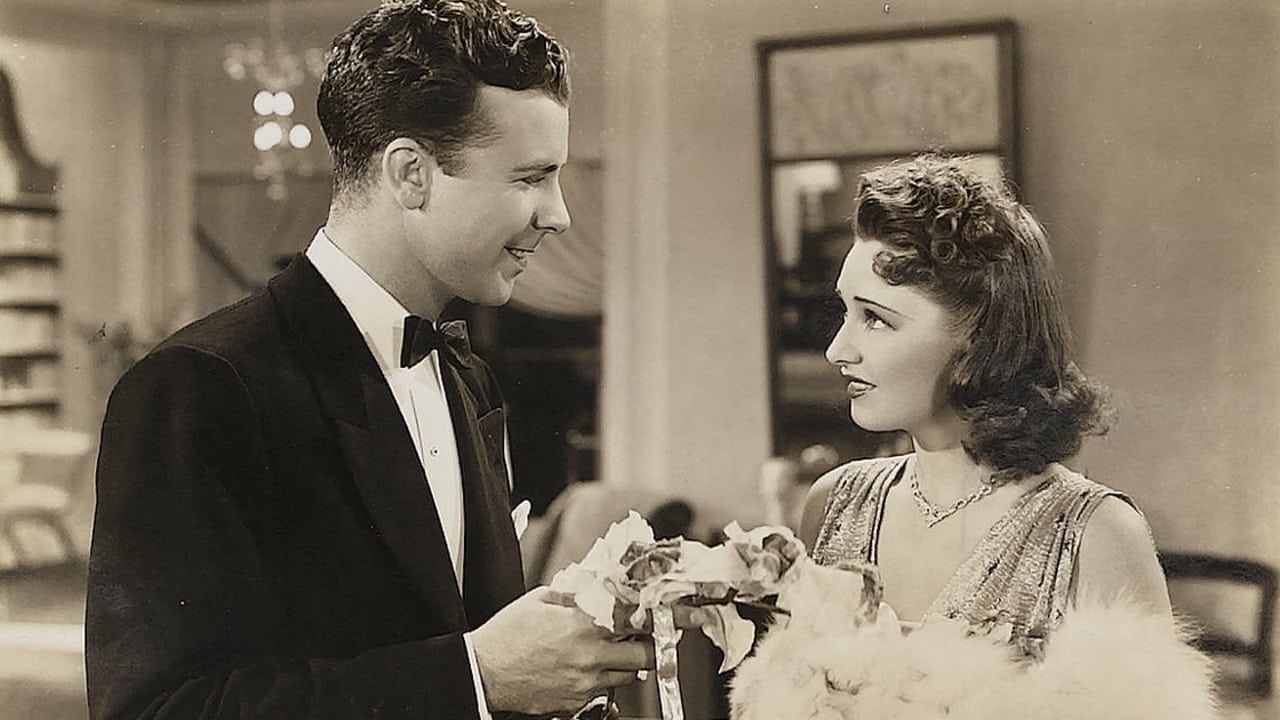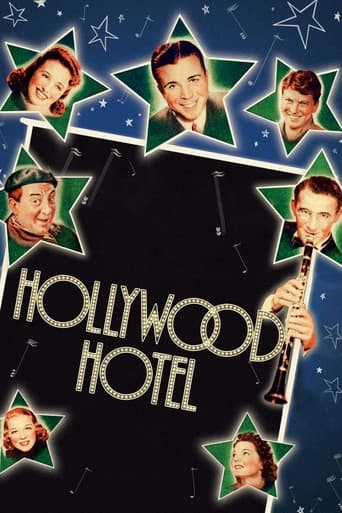

I totally believe in not rewriting history, and it is always interesting to see how minorities were treated in films. However, the blackface scene in this movie made me cringe.That out of the way, Hollywood Hotel is pleasant enough. Ronnie Bowers (Dick Powell) is a saxophone player in Benny Goodman's band, He wins a talent contest and the prize is a ten-week trip to Hollywood. Once there, he is brought to the Hollywood Hotel.We then meet a real diva, Mona Marshall (Lola Lane), her sister (Mabel Todd), her father Chester (Hugh Herbert), and her secretary (Glenda Farrell). Angry that she didn't get a role she wanted, Mona leaves the city even though a new film of hers opens that night. A waitress who resembles her, Virginia (Rosemary Lane) is hired to impersonate her, and Ronnie escorts her to the premiere.When Mona finds out, she's livid and has Virginia and Ronnie fired. Ronnie gets a job as a waiter. He's discovered, but it's to dub for the male star of Mona's new movie.Lots of music, good performances. Nothing special.
... View MoreThis is a fun movie and anyone who enjoys the WB musicals of the 30's should love it.Now, the great joke. Ted Healy and Louella Parsons are in an elevator riding up to see Lola Lane (mona marshall).Ted Healy: HEY PARSONS what do I have to do to get in your column, take a bath in champagne?Louella Parsons: SOAP AND WATER WILL DO.Fun songs, some great views of TWA DC3 airliners. Great musicians, Gene Krupa, Johnny Davis, Harry James, and many more. Great tunes too with a super and famous drum solo by Gene Krupa.
... View More"Hollywood Hotel" is a nice bit of nostalgia that gives you a chance to see Hollywood of the past. You'll see glimpses of the Brown Derby restaurant, the Hollywood Bowl, Louella Parsons playing herself and see a fictionalized story of a young talent (Dick Powell) being discovered and made a star. It's all pretty good fun...but it's FAR from a perfect picture. That's because there are several characters that are absolutely dreadful. You know it's got some terrible characters when Hugh Herbert and Ted Healy are NOT among the most unlikable and obnoxious folks in the film (and they are unlikable and obnoxious)! The most obvious and rather embarrassing performance is Lola Lane parodying an obnoxious and overrated actress. There's a fine line between being funny and just being obnoxious--Lola, unfortunately, is not funny in this role and the director (Busby Berkeley) did a lousy job of getting a believable performance out of her. But, the absolutely WORST is Mabel Todd who plays a cretin--an absolutely horrid and unfunny character that is MUCH less subtle than Jerry Lewis' characters from the 1950s. She is simply a cancer on the film and every second she's in the movie is dreadful. Fortunately, she's only in a few scenes here and there but it's amazing just how easy I found it to hate her. Now you might think I am being too harsh--see the movie yourself and I can almost guarantee you'll agree with me.It's all such a big shame, as there are a lot of things to like about the film. You get to see Benny Goodman and his orchestra in their prime, a VERY young Ronald Reagan in one of his first films (and, you'll probably notice how different his voice is) and a couple decent performances by Powell and Rosemary Lane (Lola's real-life sister). It's also an interesting film because in many ways the plot is like the one later used in "Singing in the Rain". It's so similar that fans of this later film should be fascinating due to the parallels.By the way, there are a couple cringe-worthy and politically incorrect moments to look out for if you see the film. There's the very gay fashion designer as well as when Hugh Herbert is in black-face (uggh).
... View MoreWhen we talk Hollywood Hotel we could be talking about one of three things, the actual hotel, the radio program, and this film which was partially inspired by the first two. Dick Powell was the host of the Hollywood Hotel program on CBS radio network in which Louella Parsons dished out the weekly scoop on the stars.Powell and Parsons debuted the Hollywood Hotel program in 1934 so by 1937 it had its fair share of the radio audience. Powell hosted, sang, and kibitzed with Louella and her movie star guests. With the power she had with her column, she was able to get the various stars to go on and plug their latest films for nothing.Then the American Federation of Radio Artists stepped in and demanded she pay wages accordingly and they won the case. That ended the Hollywood Hotel program in 1938. Of course both Powell and Louella went on to other radio venues. The whole story is covered in the Tony Thomas book, The Films Of Dick Powell.But before the plug was pulled this film came out from Powell's home studio of Warner Brothers inspired by the radio program. Powell plays a singer/saxophonist with the Benny Goodman band who gets signed to a Hollywood contract. But when he gets out to Hollywood he gets himself tangled up with an egotistical film star Lola Lane, her lookalike double real life sister Rosemary Lane, and a ham actor in Alan Mowbray.When Mowbray is called upon to sing in a Civil War epic he's making with Lola Lane, it's Powell's voice they use. Then Mowbray develops a Lina Lamont problem when he's asked to go on the Hollywood Hotel radio program, broadcast from the Hollywood Hotel. That's got the studio in a tizzy. Let's say the problem isn't solved the way it is Singing In The Rain, but Powell's manager Ted Healy proves to be resourceful.Richard Whiting and Johnny Mercer provide a really nice score for the film. The big hit song comes right at the beginning as the Benny Goodman band with scat singing Johnnie Davis sing Hollywood's anthem, Hooray for Hollywood. My favorite however is Powell and Rosemary Lane singing, I'm Like A Fish Out Of Water. Just listening to Johnny Mercer's lyrics about Ginger Rogers running the Brooklyn Dodgers or Sally Rand without her fan, it's a compendium of American popular culture in the Thirties.Busby Berkeley does the choreography here and while the film doesn't have the soaring imaginary stuff that his earlier work with Warner Brothers has, the numbers are well staged. Berkeley's big moment is in a drive-in eatery where Powell and Healy have been forced to take jobs. The number starts with Benny Goodman broadcasting from the Hollywood Hotel doing Let That Be A Lesson To You and then at the drive-in Powell, Lane and the entire place start joining in song to the exasperation of owner Edgar Kennedy. And you know what you can expect from Edgar Kennedy exasperation.Benny Goodman gets to show why he was named the King Of Swing when the band with drummer Gene Krupa and xylophonist Lionel Hampton as part of his ensemble. That together with Frances Langford singing as well. And possibly the last surviving cast member of the group was a fellow who had a small bit as a radio announcer. He died in 2004, but not before he became the 40th President of the United States. Ronald Reagan always credited Dick Powell and Pat O'Brien as being the two guys on Warner Brothers who were the most helpful to an eager young player looking to make his mark.Hollywood Hotel is one delightful and entertaining motion picture, dated, but charmingly so.
... View More